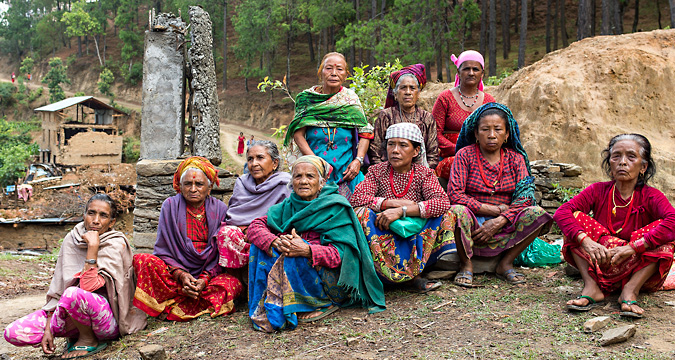The gender factor in Nepal's reconstruction
Date:
Author: Ziad Sheikh
On April 25 life changed for all of us who live, love or are related in any way to Nepal, but especially for the family members and loved ones of more than 8,800 people who perished, for those who were injured and for the hundreds of thousands who lost their homes and sources of livelihood.

The 7.8-magnitude earthquake left 2.8 million people in need of urgent humanitarian assistance and billions of dollars in damages and loses. The earthquake impacted everyone, but poverty, exclusion, discrimination and widespread inequalities were critical factors that defined who died and how the survivors are dealing with and responding to disaster.
Along with children, senior citizens, people living with disability, caste-based and ethnic minorities, women — who represent 51 percent of the population of Nepal — have been the most adversely affected. Of these groups, women constitute the single largest: Fifty-five percent of the earthquake casualties were women and 26 percent of the damaged houses belong to female headed households. Women, who tend to occupy less skilled and informal jobs in the heavily impacted tourism sector will be more likely to lose their jobs until the economy reboots. In agriculture, another sector needing significant support, women make up over 60 percent of the labor force.
The government of Nepal has ratified several international instruments on gender equality and women’s rights, including the U.N. Convention on the Elimination of All Forms of Discrimination Against Women — or CEDAW — and has financially translated its commitments into action by adopting a Gender Responsive Budgeting system since 2007-08. The proportion of the budget directly contributing to gender equality has increased from about 11 percent in 2007-08 to almost 22 percent in 2014-15.
Emergencies should not be the exception to this progress. Gender sensitivity and gender-based planning, budgeting and implementation should be present in all recovery and reconstruction processes for Nepal. Women are critical partners for success, and they have the right to participate in the decision-making on how and where resources should be allocated.
Moreover, women and other disadvantaged groups must be at the center of the implementation. Women not only have useful skills and knowledge to contribute, but also relevant social information about their communities. Women know and understand their family’s needs, they know their neighbors’ children and frequently have a strong and extended social network. Their contributions can strengthen the collective resilience to future shocks and disasters. They deserve equal opportunities to play an active role in designing the future of their communities.
These factors will no doubt be on the minds of the representatives from governments and international institutions who will gather this week at the donor conference in Kathmandu. The Post-Disaster Needs Assessment — Nepal’s assessment of the impact of the earthquake and major aftershocks — recognizes the importance of a gender perspective, dedicating a stand-alone chapter to gender equality and social inclusion, as well as a transversal approach across all sectors of the recovery.
The PDNA further recognizes that viewing women and certain social groups who have been disproportionately affected simply as victims only exacerbates their vulnerability. It acknowledges that the representation of discriminated social groups by all recovery programs is not only essential to ensure they benefit equally from the recovery programs, but also to ensure that they are not further marginalized.
Committed support from the international community, as well as responsible investment and implementation of the resources will be needed to restore Nepal’s economy and to prevent poverty, exclusion, discrimination and inequalities from causing additional casualties.
The urgency of the situation should not cloud the long-term objectives and distract us from the ongoing needs and opportunities for Nepal’s advancement on the path to fully achieving women’s empowerment and gender equality. On the contrary, ensuring women’s full participation in the recovery process has enormous potential to contribute to building a stronger Nepal where inclusion, social justice and gender equality are a reality for all.
About the author
Ziad Sheikh assumed the position of country representative of U.N. Women in Nepal in March 2012. Before this, he served as U.N. Women’s Resource Mobilization Lead in New York, HQ and as UNIFEM’s deputy country director in Afghanistan. From 2003-2007, Ziad worked with UNICEF designing and implementing global, regional and country level policy advocacy strategies and campaigns for girls’ education and maternal health, including with UNICEF India. Prior to joining the U.N. system, he served with Save the Children UK.
This story has been published on "devex" under Global Views. See more online version on devex or download from our Archieved